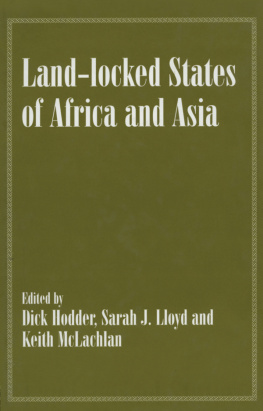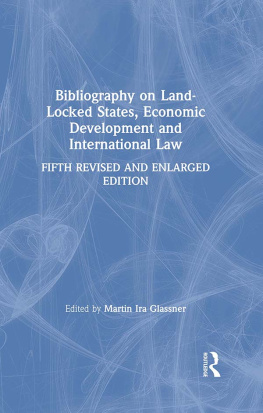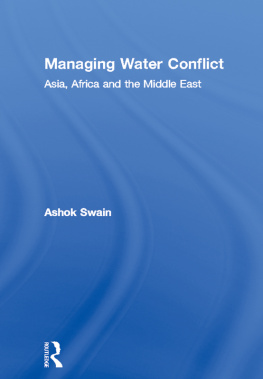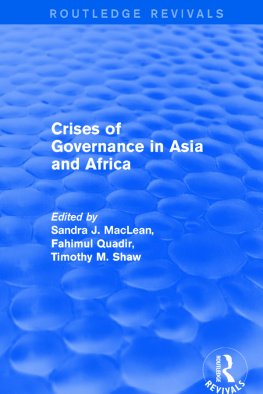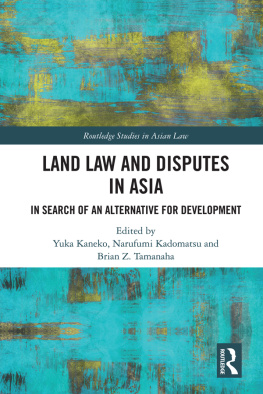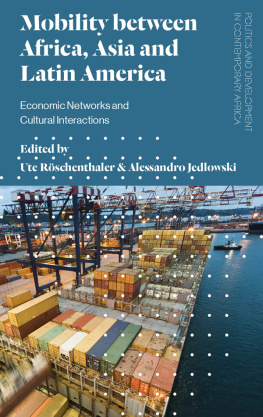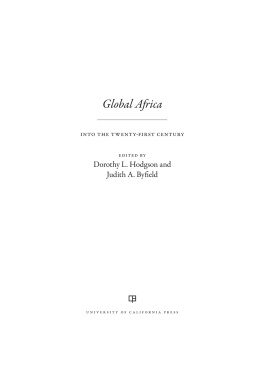Land-locked States of Africa and Asia
OF RELATED INTEREST
THE TRANSFORMATION OF SECURITY IN THE ASIA PACIFIC REGION
Desmond Ball
NGOS AND ENVIRONMENTAL POLICIES ASIA AND AFRICA
edited by David Potter
VIOLENCE IN SOUTHERN AFRICA
edited by William Gutteridge and J. E. Spence
INDUSTRIALISATION AND THE BRITISH COLONIAL STATE WEST AFRICA 19391951
Lawrence J. Butler
THE POLITICAL KINGDOM IN UGANDA
David E. Apter
First published in 1998 by
FRANK CASS PUBLISHERS
This edition published 2013 by Routledge
2 Park Square, Milton Park, Abingdon, Oxon OX14 4RN
711 Third Avenue, New York, NY 10017
Routledge is an imprint of the Taylor & Francis Group, an informa business
Copyright 1998 Frank Cass
British Library Cataloguing in Publication Data
Land-locked states of Africa and Asia
1. Landlocked states 2. Landlocked states Economic aspects 3. Access to the sea (International law) 4. Landlocked state International cooperation
I. Hodder, Dick II. Lloyd, Sarah J. III. McLachlan, K.S. (Keith Stanley), 1937
33.95
ISBN 0714 64829 9
ISBN 0714 64371 8
Library of Congress Cataloging-in-Publication Data
Land-locked states of Africa and Asia / edited by Dick Hodder, Sarah J. Lloyd and Keith McLachlan.
p. cm.
Geopolitics and international boundaries, volume 2, number 1, summer 1997, special issue Galley.
Includes index.
ISBN 0-7146-4829-9 (hardcover). ISBN 0-7146-4371-8 (pbk.)
1. Access to the sea (International law) 2. Landlocked statesAfrica. 3. Landlocked statesAsia. I. Hodder, Dick. II. Lloyd, Sarah J. III. McLachlan, I.S. (Keith Stanley) IV. Geopolitics and international boundaries, v. 2, no. 1, summer 1997 (Special issue) KZA1375.L36 1997
341.444--dc21 | 97-38217
CIP |
This group of studies first appeared in a Special Issue on Land-locked States of Africa and Asia in Geopolitics and International Boundaries 2/1 (Summer 1997) published by Frank Cass.
All rights reserved. No part of this publication may be reproduced in any form or by any means, electronic, mechanical, photocopying, recording or otherwise, without the prior permission of the publishers.
In honour of Ieuan Ll. Griffiths
Keith McLachlan
Land-lockedness is the condition of having no access to the open sea and is one that affects some 44 countries. More states still struggle to preserve their independence in the face of restricted openings to the sea via corridors or constrained seaboards. Given the violence surrounding the creation of improved outlets to the sea, as in the case of Iraq in the invasion of Kuwait in August 1990, and the elimination of existing corridors, as in the case of Ethiopias loss of Eritrea in 1993, the subject has an interest that will not be gainsaid. Yet there are few major studies of the subject per se with the honourable exception of Professor Ira Glassner (see his contribution).1
The present volume is, it is hoped, a useful addition to the literature dealing with the problems of land-lockedness, access and communications. It is the product of two separate conferences held at the Geopolitics & International Boundaries Research Centre (GRC) in the School of Oriental & African Studies (SOAS) with the addition of several specially commissioned articles. The editors have taken the liberty of harmonising spellings, place-names and the styles of referencing but have otherwise left authors contributions in their original form.
Africa was the home of the majority of land-locked states arising from the original scramble for Africa. The nature of colonial boundaries reflected both the pattern of colonial occupation, particularly after the Berlin Africa Conference in 1884, and intra-colonial boundaries where independent states were former administrative districts of larger colonial entities, as in the case of French West Africa and French Equatorial Africa.2 Colonialism also played a role in creating straight-line boundaries, though this, as in the case of Zaire, did not preclude openings to the sea. Ethiopia is a late land-locked state which was a result of the independence of Eritrea in May 1993.
There has been a rapid increase in recent years in the number of states that are land-locked, that is, have no direct access to the sea. The break up of the USSR and the political emancipation of its former territories in Caucasia, Transcaucasia and Central Asia was the cause in 199192 of the sudden expansion in land-lockedness (see ).
The events following the independence of the states of the former USSR once more raise questions concerning the viability of land-locked countries as truly autonomous nation-states. It has long been an axiom that movements for the creation of new states rarely succeed where the area contested has no outlet to the sea.3 Contemporary Russia makes no secret of its determination to control Azerbaijan and the Central Asian states over matters such as the export of oil and natural gas by pipeline, rejecting all routes that omitted transit through its territory.4 It is appropriate timing, therefore, that a new examination is given to the overall difficulty of landlocked states as essayed in this volume.
Since Africa was the birthplace of serious studies of the nature of landlocked states, this volume begins its regional coverage with an analysis of the experience of land-lockedness in Africa. The point is well made that Given the large but compact continental landmass of Africa, its division into fifty-two independent states, more than any other continent,5 some landlocked states are to be expected. Add that Africa was partitioned by alien imperial powersit is inevitable that there are many African land-locked states. The balkanisation process, seen as an unnecessary and short-sighted concomitant of de-colonisation, is a recurring theme in the study of landlockedness, as in West Africa where natural resource endowment is poor and the colonial experience of development largely negative. The coming of the railways in this area was late in the colonial period and did little to change the status of the area from being a colonial backwater.
The situation in East Africa was mixed, the British territories along the Mombasa-Kampala railway benefiting early from improved communications. Quite the opposite occurred in Rwanda and Burundi, where no modem transport system connected the territories to the sea. The development of other East African territories for the export of agricultural goods and copper is examined, with special concern for the growth of Rhodesian communications systems with their advantages and shortcomings. The growth of rail and other transport networks in Africa as a means of overcoming the difficulties of land-lockedness where distance of some countries from the sea is very considerable. The case of Zambia, is an instance of the conflict between legal regimes for land-locked states and the brutality of realpolitik. Eleven of the land-locked states of Africa are small, remote, economically and politically weak, underdeveloped and dependent. Land-lockedness, with very few countries being excepted, makes so much worse the constraints particularly affecting external trade on economic, political and social development in Africa.



